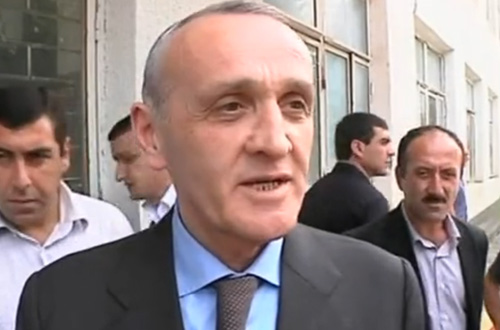| New Abkhaz Leader |
| Civil Georgia, Tbilisi / 27 Aug.'11 / 17:43 |

In this screengrab from Russian TV footage, Alexander Ankvab is seen at a polling station in Sokhumi before casting a ballot on August 26.
Alexander Ankvab, Abkhaz vice president, has been elected as the third leader of the breakaway region in Friday’s vote hailed by Moscow and not recognized by Tbilisi and its western partners.
Reactions to Abkhaz vote:
- Georgian MFA Condemns Abkhaz Vote
- Medvedev Congratulates Ankvab
- Russian Patriarch Congratulates Ankvab
- U.S. ‘Does Not Recognize’ Abkhaz Vote
- EU 'Does Not Recognise' Abkhaz Vote
- NATO 'Does Not Recognise' Abkhaz Vote
- European Parliament President on Abkhaz Vote
- Georgian Opposition Party 'Respects' Choice of Abkhaz Voters
Ankvab avoided a runoff by garnering up to 55% of votes, defeating the breakaway region’s PM Sergey Shamba and ex-vice president and opposition candidate Raul Khajimba.
Ankvab said both of his former rival candidates congratulated him on victory; Shamba and Khajimba personally made no statements yet following announcement of election results.
Ankvab, who will turn 59 in December, was a close ally of late Abkhaz leader Sergey Bagapsh, whose sudden death three months ago prompted early elections.
For six years, till 1990, Ankvab served in Tbilisi in a capacity of Soviet Georgia’s deputy interior minister. During the armed conflict in Abkhazia in early 1990s he was interior minister in the rebel Abkhaz government. After the war he left Abkhazia and spent almost ten years, till 2004, in Moscow working in business.
After his political comeback in Abkhazia he tried to run for the breakaway region’s presidency in 2004, but was not registered as a candidate after he refused to pass exam in the Abkhaz language – a requirements which he met this time; he subsequently backed in those elections Sergey Bagapsh and after the latter became the region’s leader following a fiercely disputed elections with Raul Khajimba, Ankvab was appointed as Prime Minister.
After Bagapsh’s re-election in December 2009, Ankvab became vice president – the post now he vows to scrap as part of his pledge to downsize bureaucracy.
Straight-talking Ankvab, who has a reputation of a decisive person, prompted some local observers in Abkhazia to ponder whether his pre-election vows to consolidate power through abolishing posts of vice president, deputy prime ministers and possibly of prime minister at a later stage, will eventually result into something like an authoritarian way of rule.
But responding to such fears, Ankvab said at a news conference in Sokhumi on August 27, that “dictatorship” was not possible in Abkhazia because the society would not accept it.
“We will be establishing order based on the constitutional rights, there will be no dictatorship in Abkhazia – the society simply will not accept it,” Ankvab said, adding that the Abkhazia society would not also accept such politicians “who fail to bring their decisions to the end.”
At the same news conference he tried to allay concerns over his handling of the media, dismissing suggestions that he would try to restrict access of the press to the government; Ankvab said some tried to portray him as “a closed person for the press” and were “disseminating ‘horror stories’ about me.”
“That’s not true; I am not afraid of TV cameras and journalists,” he said.
Ankvab also said that he would continue course of late Abkhaz leader, Sergey Bagapsh, “who was keen supporter of relations with Russia and we will further develop those ties.”
“We will demonstrate to the world, that Russia made a right decision by recognizing our independence,” Ankvab said.
There have been at least four, or possibly five, attempts on Ankvab's life in a period between 2005 and September, 2010.
In February 2005 a group of unknown gunmen opened fire on a convoy carrying Ankvab, then PM, outside Sokhumi. Local television reported at the time, that his car was hit by 17 bullets; Ankvab, however, was riding in his deputy’s car and survived unharmed.
Two months later Ankvab again survived unharmed when unknown gunmen opened fire on his convoy near Sokhumi in which Ankvab’s driver was wounded.
A roadside land mine, found in June 2007 on a road between Sokhumi and Gudauta, which was a regular route of Ankvab’s convoy, was also believed to have been aimed at him.
In July, 2007 Ankvab was slightly injured with shrapnel after his car came under grenade attack again on the road between Gudauta and Sokhumi.
The last attack came in September, 2010 when Ankvab was wounded in leg and hand after a grenade hit his house in Gudauta.
No one has ever been arrested or charged for those attacks, which Ankvab himself blamed on “internal” Abkhaz forces; he, however, has never publicly elaborated further into details.
